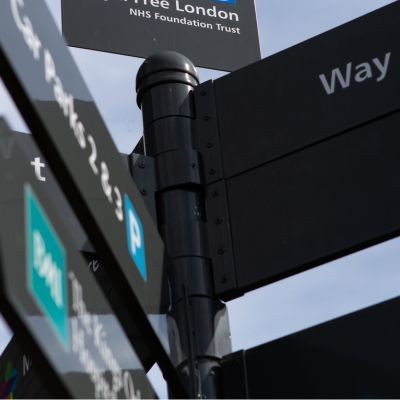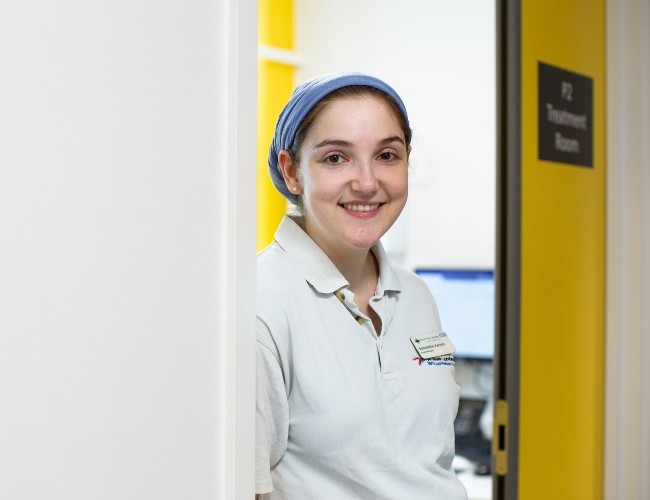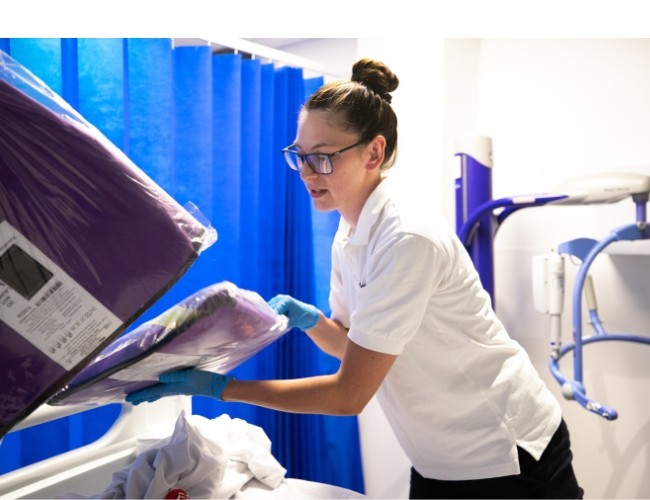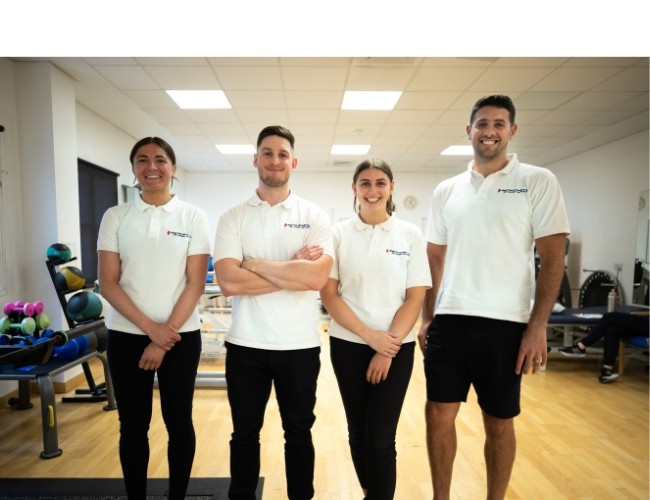By helping people to move optimally, physiotherapy promotes health and wellbeing. Physiotherapy can be helpful for people of all ages with a wide variety of health conditions.
Children’s physiotherapists use specialist knowledge of child development and childhood conditions to treat babies, children and young people.
They assess and treat movement difficulties, developmental concerns or pain, which may impact on daily activities and function.
Children’s physiotherapists also treat children and young people who have short-term musculoskeletal sprains and strains, and help them recover after fractures.
Whether these movement difficulties are from birth, develop during childhood, are associated with a long-term condition or result from an injury, children’s physiotherapists aim to help children acquire or regain functional movement skills.
The focus is on helping children and young people achieve their best possible physical function to enable them to participate in everyday activities at home, at school and in their community.
Our children’s physiotherapy service provides assessment, advice and treatment to children and young people from birth up to 18 years old. The service is provided in the community and in hospital.
Our physiotherapists work closely with the child/young person and their family to ensure family-centred care, and the wider multidisciplinary team including doctors, nurses, occupational therapists, speech and language therapists, play specialists, teachers, teaching assistants and colleagues in social care when appropriate.
You can read a leaflet about physiotherapy for children from the Chartered Society of Physiotherapy website.
Royal Free Hospital-based service
Tel: 07929 790 802
Email: rf.
Royal Free Hospital-based service (for babies 0-2 years with developmental needs undergoing assessment):
Tel: 020 7472 6629
Email: rf.
Ponseti service
Tel: 020 7472 6629
Email: rf-tr.
Camden MOSAIC child development team
Tel: 020 3317 2200
Community and mainstream school service
Tel: 020 3317 2200
Email: rf.
Swiss Cottage School service
Tel: 020 7681 8080 (ext 206 or 208)
Email: rf-tr.otandptteamscs@nhs.net
Head of children and young people’s therapies
Tel: 020 7830 2535
Email: eleftheria.
Information for parents, carers and children/young people
During a physiotherapy assessment, the physiotherapist needs to be able to see the joint above and below the area that is causing a problem.
It is helpful for children to understand how they need to be dressed for their appointments:
- For a hip, knee or ankle assessment, patients should wear shorts.
- For a back, shoulder or arm assessment, patients should wear a vest or sleeveless T-shirt.
- Babies being treated for developmental issues are initially assessed in a nappy and then treated in a vest and nappy.
Once the physiotherapy assessment has been carried out and the areas where physiotherapy may help are identified, the goals for treatment will be discussed and agreed with the child/young person and their parents/carers.
These goals will be reviewed at the end of the treatment block.
To ensure success of physiotherapy, home programmes are provided by the physiotherapist. This may be a series of exercises, activities or movements. The physiotherapist will explain why the programme is relevant and how to carry it out.
The programme will normally be given in writing, but in some cases a movement sequence can be recorded on the parent/carer’s phone.
In addition, the physiotherapist will make recommendations for regular physical activity which will support a child/young person’s function.
Feedback is essential for best practice and full involvement from our children, young people and their families.
Please download and complete the user feedback questionnaire to help improve our service in the future. You can return the questionnaire to your therapist.
Where your physiotherapy appointment will be will depend on the service required.
Please read your appointment letter carefully to ensure you know where to go for your appointment.
Please complete the paediatric occupational therapy/physiotherapy consent form before attending your first physiotherapy appointment.
The physiotherapist will also sign the form and then add it to your child's electronic health record.
Young people over the age of 14 may attend their follow-up physiotherapy appointments without an adult if they have prior written consent from their parent/carer.
Parents and carers need to attend the first appointment and must complete a consent form.
Useful resources
Please note, the Royal Free London is not responsible for the information provided by external organisations. Please refer to the original author.
The Association of Paediatric Chartered Physiotherapists (APCP) is one of the Chartered Society of Physiotherapy's largest professional networks and aims to support paediatric physiotherapists to deliver evidence-based care so children and young people can achieve their potential.
APCP has produced a number of information leaflets on a range of conditions and topics commonly referred to children's physiotherapy for advice and support.
The leaflets have been written by qualified paediatric physiotherapists after an initial review of literature and where there is a lack of evidence, a consensus of expert opinion is agreed, correct at the time of publication.
These leaflets are freely available and intended for distribution to parents and carers.
- Physiotherapy for children
- Physiotherapy in schools — a guide for schools and professionals
- Down’s syndrome
- Osgood Schlatter's disease
- Calcaneal apophysitis/Sever’s disease
- Positional talipes calcaneovalgus (CTCV)
- Positional talipes equinovarus (CTEV)
- Bone health
- Perthes Disease (Legg-Calve-Perthes Disease)
- Hypermobility and Hypermobility Spectrum Disorder
- Head turning preference and plagiocephaly
- Intoeing gait
- Flat feet in young children
- Choosing footwear for children
- Choosing the right school bag
- Awake time ideas
- Promoting physical development: lying to sitting
- Baby walkers: are they necessary?
- Standing frames
- Selective dorsal rhizotomy
- Action Duchenne: provides support and advice for children and young people with Duchenne Muscular Dystrophy (DMD).
- Activity Alliance: support for disabled people to find opportunities to get active.
- Bliss: a charity for babies born prematurely or sick.
- Brittle Bone Society: supporting people with osteogenesis imperfecta.
- CanChild: a research and educational centre that provides evidence-based information to improve the lives of disabled children and young people and their families.
- Cerebral Palsy Sport: supporting people with cerebral palsy to play, participate and enjoy sport and physical activity.
- Contact: a charity for families of disabled children, supporting them with guidance and information and bringing families together.
- Down's Syndrome Association: information for parents of children with Down's syndrome.
- Duchenne UK: information about Duchenne Muscular Dystrophy.
- Dyspraxia Foundation: parent group for support and information about dyspraxia.
- Ei SMART: a framework to give high risk babies the best start in life.
- Erbs Palsy Group: support for families affected by Erb's Palsy.
- Juvenile Idiopathic Arthritis: information and support for people affected by juvenile idiopathic and rheumatoid arthritis.
- Muscular Dystrophy UK: information and support for people living with muscle wasting conditions.
- National Autistic Association: information, support and pioneering services for people with autism.
- Pathways: tools to maximise child development.
- NHS physical activity guidelines for children and young people.
- Information about the Ponseti method for the treatment of clubfoot.
- Riding for the Disabled Association: horse riding and carriage driving for children and young people with physical and learning disabilities.
- Scoliosis Society: patient support organisation for people with scoliosis and their families.
- Scope UK: a charity campaigning for disability equality in England and Wales, providing advice and support for disabled people including help for parents when their children are newly diagnosed.
- Skills for Action: information about joint hypermobility, low muscle tone and developmental co-ordination disorder in children.
- Spinal Muscular Atrophy UK: support and information about spinal muscular atrophy.
- Steps: a national charity working for those whose lives are affected by childhood lower limb conditions.
Who can be referred?
- Children and young people resident within the London Borough of Camden
- children and young people registered with a Camden GP (on behalf of NHS Camden)
- children attending Camden mainstream schools (including primary, secondary and special schools) where provision is delivered on site
- children and young people between the ages of 0 and 18 (0 to 19 years where the young person remains in full time education).
Who can refer?
- GPs
- health care professionals: physiotherapists, occupational therapists, and speech and language therapists
- health visitors and school nurses
- Camden SEN department
- hospital consultants.
How to make a referral
Babies, children and young people can be referred by health professionals to the service through the online single point of referral (SPOR) system.
This is auto-populated on the EMIS system for those who have access.
For more information and guidance, please contact the SPOR administrator at adminSPOR.
Other referrals
- Babies with club foot (or talipes equinovarus) can be referred to the Ponseti service: rf-tr.
rfh-ponseti .@nhs.net - The Royal Free Hospital offers an antenatal group meeting to families with infants diagnosed with congenital talipes equinovarus to share information on treatment and answer questions relating to the treatment. The referral is made by foetal medicine units and midwives. This is a tertiary service and is not dependent on postcode.
- Health visitor physiotherapy clinic for under two-year-olds: this is booked on the Health Visitor stream of SystmOne by health visitors.
Reasons for referral
- Musculoskeletal problems, eg sports injuries, strains, sprains, orthopaedic rehabilitation following ACL reconstruction or fracture, postural and spinal pain, growth-related musculoskeletal conditions, torticollis, symptomatic normal variants, symptomatic flat feet.
- Physical disabilities related to neurological and neuromuscular conditions, eg cerebral palsy and muscular dystrophy.
- Difficulties associated with balance and coordination.
- Delay in acquiring motor skills.
- Orthopaedic and rheumatological conditions, eg childhood arthritis, Sever’s disease.
- Rehabilitation after prolonged illness.
- Congenital disorders, eg torticollis, plagiocephaly, spina bifida and Erb’s palsy.
- Medical conditions affecting movement
- Down’s syndrome.
 Translate
Translate




